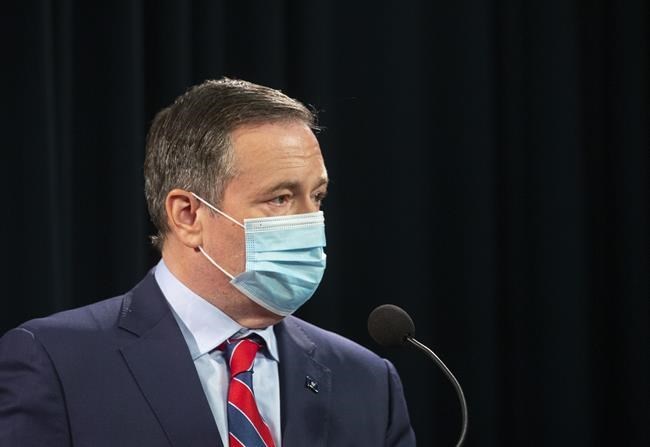Alberta Premier Jason Kenney, facing a COVID-19 crisis that is collapsing the province's health-care system, says his government will implement a vaccine passport.
Kenney also declared Wednesday a state of public health emergency, with strict new limits on gatherings, and warned the province is at risk of exhausting intensive care beds and staff within 10 days.
Kenney said he was reluctant to approve what he called the "restriction exemption program."
"With unvaccinated patients overwhelming now our hospitals, this is now the only responsible choice that we have," he said.
Several provinces are bringing in vaccine passports, which compel people to prove they have been vaccinated before being allowed to use non-essential services such as pubs and restaurants.
Kenney had resisted such measures for health privacy reasons. But critics said he did so for political reasons to prevent a revolt by anti-restriction members of his United Conservative caucus.
Alberta lifted almost all public health restrictions more than two months ago and is facing skyrocketing COVID-19 cases that have pushed intensive care beds beyond normal capacity and forced mass cancellations of non-urgent surgeries.
Kenney apologized Wednesday and said lifting the restrictions was the wrong call.
"The government’s first obligation must be to avoid large numbers of preventable deaths. We must deal with the reality we are facing. We cannot wish it away."
The province has faced significant pushback over its handling of COVID-19 and its hesitation to introduce public health restrictions and removing them before any other Canadian province.
In the summer, the province announced they would remove the majority of public health restrictions but offered no evidence to back-up their decision.
Alberta has more than 18,000 active cases – the most of any province. The next closest province is Quebec, which has less than 7,000 active cases and then British Columbia with about 6,100 active cases.
On Wednesday, there were 877 people in hospital with the illness, including 218 in intensive care.
The measures, according to the provincial announcement, that are being introduced as of Thursday are:
- Mandatory working from home, unless the employer has determined a physical presence is required for operational effectiveness.
- Indoor private gatherings for vaccine-eligible, fully vaccinated individuals are limited to a single household plus one other household to a maximum of 10 people, with no restrictions on children under the age of 12.
- Attendance at any indoor private social gathering is not permitted for vaccine-eligible individuals who are unvaccinated.
- Outdoor private social gatherings are permitted to a maximum of 200 people, with two-metre physical distancing maintained at all times.
- Places of worship must limit attendance to one-third fire code capacity.
- Face masks will be mandatory and there must be two-metre physical distancing between households or two close contacts for those living alone.
- No attendance restrictions for outdoor events and outdoor facilities, but two-metre physical distancing must be in place.
- Mandatory masking for students in grades 4 and up, plus staff and teachers in all grades. Schools that can implement an alternate COVID safety plan can be exempted from mandatory masking.
- Elementary schools are to implement class cohorting.
- Youth aged 18 and under are not required to mask or maintain physical distancing during a physical activity, such as a team sport.
- Spectator attendance is limited to one-third fire code capacity and attendees must be masked and ensure physical distancing between different households or an individual who lives alone and their two close contacts.
- Children’s day camps must have two-metre physical distancing between participants and masking indoors.
The following measures will take effect on Monday:
- Outdoor dining is allowed with only a maximum of six individuals per table involving one household or two close contacts for those living alone.
- Liquor sales will stop at 10 p.m. and consumption will need to be completed by 11 p.m.
- All indoor ceremonies and services are limited to 50 attendees or 50 per cent fire code capacity, whichever is less.
- One-on-one athletic training or individual workouts are permitted but three-metre physical distancing is required.
This report by The Canadian Press was first published Sept. 15, 2021.
The Canadian Press




